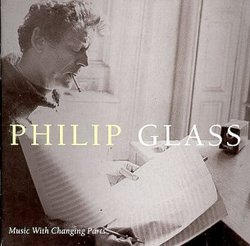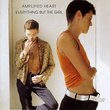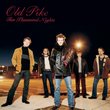| All Artists: Philip Glass, Jon Gibson, Steve Chambers, Arthur Murphy, Barbara Benary, Dickie Landry, Robert Prado Title: Philip Glass: Music with Changing Parts Members Wishing: 2 Total Copies: 0 Label: Nonesuch Release Date: 2/1/1994 Genres: Dance & Electronic, Jazz, Classical Styles: Techno, Chamber Music, Historical Periods, Modern, 20th, & 21st Century Number of Discs: 1 SwapaCD Credits: 1 UPCs: 075597932522, 075597932546, 755979325226 |
Search - Philip Glass, Jon Gibson, Steve Chambers :: Philip Glass: Music with Changing Parts
 | Philip Glass, Jon Gibson, Steve Chambers Philip Glass: Music with Changing Parts Genres: Dance & Electronic, Jazz, Classical Philip Glass's early works have purely functional titles, and this one is no exception. His masterpiece in this repetitious and rigorously structural composition style-- Music in Twelve Parts--may be just too much for some... more » |
Larger Image |
CD DetailsSynopsis
Amazon.com essential recording Philip Glass's early works have purely functional titles, and this one is no exception. His masterpiece in this repetitious and rigorously structural composition style-- Music in Twelve Parts--may be just too much for some people to take. If so, then this disc may be just the ticket. Of course, Glass's many fans will snap it up as a matter of course, but as the title implies, there's somewhat more happening here than in his very first minimalist works--just enough so that newcomers to the style ought to find something to enjoy. An important disc, then, both as a milestone in the history of a major musical movement and a reminder of style that the composer has long since abandoned. --David Hurwitz Similarly Requested CDs
|
CD ReviewsHighway Mr. A. Pomeroy | Wiltshire, England | 06/22/2000 (4 out of 5 stars) "Almost a 'single' of 'Music in 12 Parts', this is easier to listen to in one sitting. It's still not headphone listening though - think of it as an audio backdrop and it works, almost, as if one was staring at an abstract painting. As Glass' career progressed he reduced the purely cyclic / generative elements of his works to humanistic levels - 'Einstein on the Beach' and 'Dance 1-5' were the last things he did that could be recognisable as descendents of this new music. The fact that it comes from 1971 is striking - it still sounds modern, and it's fascinating to compare it with the contemporary works of his semi-rival, Steve Reich - whilst Reich used percussive, almost jazzy rhythms, Glass' music is a steadily-flowing concrete road changing in texture but never, ever losing its cool." Different mix from the original, but great to have available Robert Kainer | houston, tx | 05/23/2001 (5 out of 5 stars) "Those familiar with the original vinyl recording of this in a very limited release from Chatham Records will definitely notice some differences in the CD remix. To my mind, the backing wind and voice parts are now overbalanced and stick out too much in front, contrary to the idea of the piece, which was that these parts were to be like overtones arising out of the churning electric organ riffs. Also the digital remastering tends to make more apparent the occasional raggedness in the performance, something that is understandable given the feat of endurance this piece probably was (most likely this was an hours-long performance whittled down to fit on 4 sides of vinyl). Still, it is great to have this in an unbroken span and not have to get up & flip the record over every 15 mins. This is Glass when he was at his best, before he became a hack; a pure driving cosmic sound that he later would disavow as 'too spacey' for his tastes." Endlessly fascinating and hypnotic.... Grigory's Girl | NYC | 03/31/2008 (5 out of 5 stars) "This is a great example of Glass's early work, and it's really quite extraordinary. It is one piece, a 61 minute and 38 second composition that is endlessly fascinating. The intensity of the composition and the performance is amazing. It is also important to note that this is the original recording remastered. Glass has re-recorded many of his earlier works (like Music in Twelve Parts and Einstein on the Beach), but this is the recording from 1973. The recording benefits greatly from the CD formate. It needs to be listened to in its entirety. It was originally released in a 2LP set, which disrupted the performance when one had to put on the seperate sides. Here the CD is crystal clear and you can enjoy the song the way it was meant to be. The CD also has some absolutely fascinating liner notes about the origins of the piece, how often it was performed, some pictures of Glass and his ensemble playing the piece in 1970's NYC, and Glass's take on the song now. Of course, many people dislike Philip Glass (why I don't know), and those who dislike him save their venom for his early work especially, which is much more minimalist and avant garde than the later works. This is one of the finest examples of his early work, which I adore."
|










